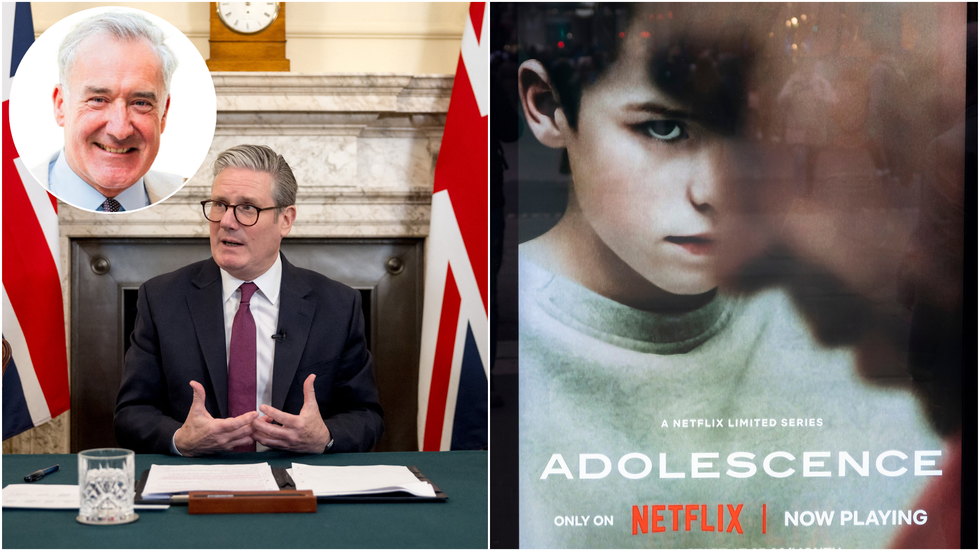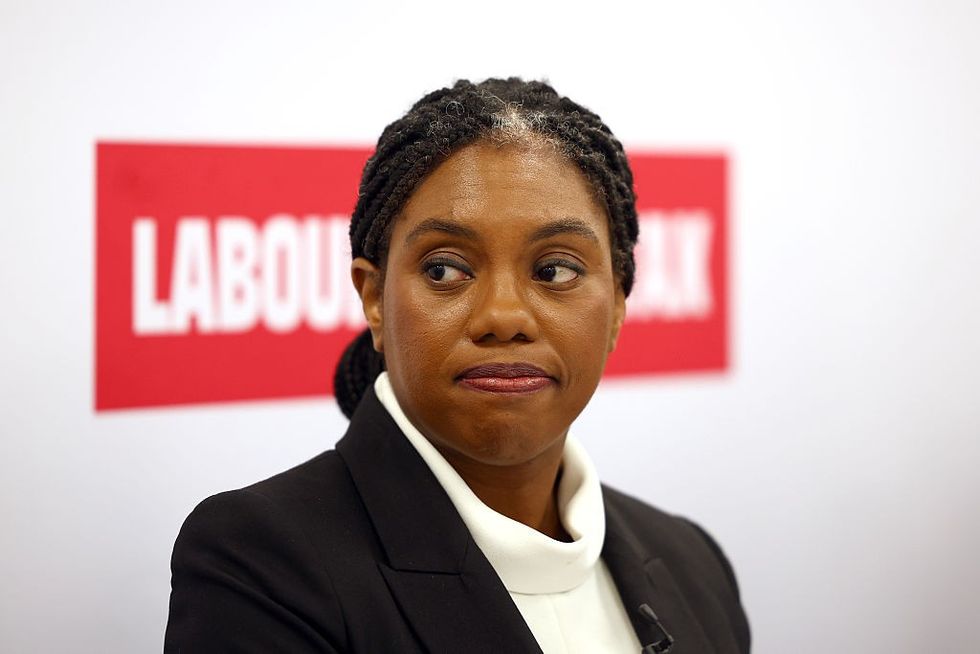Adolescence actress gives insight behind the scenes - 'We knew it would be something amazing.'
GB News
OPINION: By all means watch Adolescence, but don't be forced into it by those who insist that viewing it amounts to a test of one’s moral purity, says Colin Brazier.
Don't Miss
Most Read
Trending on GB News
One of my favourite coming-of-age films is ‘Dead Poet’s Society’. It follows the attempts of an English literature teacher, played by the late Robin Williams, to turn his pupils into free-thinkers.
For those of you who haven’t seen the movie, the all-male boarding school in Vermont (where the story is set) does not encourage cognitive diversity, and the experiment ends in tragedy.
I thought of the film this week as the hue and cry about the Netflix drama Adolescence reached Salem witch-trial proportions. In particular I recalled a scene from Dead Poet’s Society in which John Keating, the teacher played by Robin Williams, is trying to impart to his students an understanding of how group-think takes hold.
He takes his charges to a school quad and gets three of them to walk around. Without realising they’ve done so, the boys quickly fall into lockstep. The rest of the pupils start clapping in rhythm with the marching. Keating cites this as an example of how the urge to conform is deep rooted and sub-conscious. To the watching boys he says: “Some of you may be thinking you wouldn’t do that [march in step]. Well, ask yourself: why were you all clapping?”
He encourages his class to try again, everyone this time, though this time they should “find your own walk”. One of the pupils, Charlie Dalton, remains rooted to the spot. Keating asks what he’s doing. Dalton replies: “Exercising my right not to walk, sir.” Keating smiles approvingly.

Netflix drama Adolescence shows us what happens when group-think takes hold - Colin Brazier
GB News/Getty Images
I’ve thought a lot about that scene over the years and what it says about the herd mentality or, as the author Douglas Murray called it in his book of the same title, ‘The Madness of Crowds’. I thought about it at the height of lockdown, in 2020, when we were invited to start banging pots and pans once a week as a mark of thanks to the NHS.
I thought about it when my producer at Sky News said he wanted me to get involved in that Thursday evening ritual. He told me that, as Sky cameras showed Boris Johnson and Keir Starmer clapping on the stroke of 8pm, I should get up from behind my newsreaders’s desk, move to the big studio screen, and join in.
I told him I wouldn’t. That it was a short-sighted act of editorial partiality. That, when the news cycle moved on (and it became necessary to ask difficult questions of the NHS), it wouldn’t do to have been adulatory in the not-so-distant past. I explained there were lots of instances where it might have been right for a presenter to stand up and applaud. You could, for instance, make a strong case for doing so whenever a British soldier’s body was repatriated to RAF Lyneham and driven through the streets of Royal Wootton Bassett. “If I didn’t do it for those heroes, why am I being asked to do it for these?”
But it was a straw in the wind. An inkling of how the MSM is increasingly happy to run with the herd, without always thinking through what that means.
Skip forwards five years to another studio where I once worked. This week radio host Nick Ferrari was interviewing Conservative Party leader Kemi Badenoch. I’m a fan of Ferrari’s. He’s one of the best in the business and an increasingly lonely right-of-centre voice at LBC. But I think he was wrong to suggest that it was “a dereliction of duty” for Badenoch not to have watched Adolescence.
I’ve rehearsed the arguments in a previous column about why it is an act of folly for government to base policy on a work of fiction. Why Starmer should be very careful in eliding a work of dramatic entertainment (no matter how brilliantly conceived and executed) with a documentary. And, why it is a dangerous precedent to insist that a made-up story is simply so compelling and relevant that it must be shown to schoolchildren. That it must become an obligatory part of the curriculum any more than screening Dead Poet’s Society should be.

Kemi Badenoch was right to not bow to pressure and watch Netflix drama Adolescence.
Getty Images
It’s not surprising that Starmer should jump on the bandwagon and insist that everyone should do as he’s done - and watch the show. At the height of the hysteria about the killing of George Floyd, Starmer invited a photographer into his office for a picture of him ‘taking the knee’. Those were strange times. Do you remember images of uniformed police officers, unsure whether they were required to genuflect at the altar of BLM (an organisation later much discredited)? One dissonant voice rang clear. I was never a huge fan of former deputy PM Dominic Raab. A little dry and robotic. But he spoke for many when he was asked in a radio interview whether he had taken the knee. He said he would do so only “for the Queen and the Mrs when I asked her to marry me”. It was a Charlie Dalton moment. A leading public figure refusing to march in step with the crowd.
And why does it matter? Because. friends, a crowd has a tendency to become a mob. And a mob is the enemy of reason. It’s the moment the mood shifts from “you really ought to do this” to “do this, or else”. It can spring from the unlikeliest of places. I remember, as a Royal Correspondent, watching the historian (and a man I’m happy to call my friend) David Starkey, escorted by police from Kensington Palace Gardens in 1998 “for his own safety”. His crime? He was being interviewed live on the BBC ahead of the first anniversary of the death of Diana, about whom he wasn’t wholly complimentary. Some of those watching, hardcore Diana devotees, took exception to his criticism (any criticism) of the late Princess of Wales.
Perhaps you remember the week after her death, when to venture even mild doubts about Diana’s probity was to risk denunciation. Just as not clapping for the NHS or taking the knee was to risk the same two decades later.
By all means watch the excellent Adolescence. But don’t be browbeaten into doing so by those who insist that viewing it amounts to a test of one’s moral purity. And don’t for a moment think it’s okay for one work of fiction to be championed in schools by politicians, at taxpayer’s expense, ahead of similarly worthy stories for the modern age.
Let me close with the words of John Keating, from that marching scene in Dead Poet’s Society. “We all have a great need for acceptance, but you must trust that your beliefs are unique and your own, even though others may think they are odd or unpopular. Even though the herd may go: ‘that’s bad’.”







